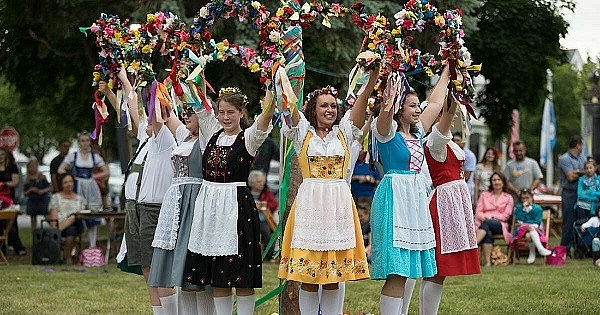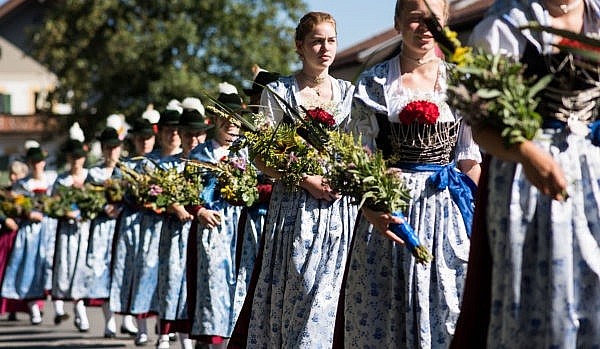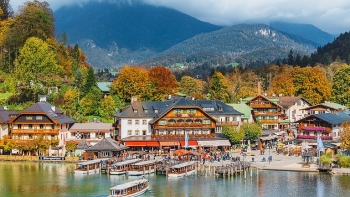German Calendar with the Public Holidays, Observances And Celebrations
17:09 | 25/09/2024 Print
 |
| Public holidays in Germany |
How many public holidays are there in Germany?
Germany will have ten national holidays overall in 2024.There are also seven regional holidays observed just in some areas.
Germany boasts rather generous public holiday count (gesetzliche Feiertage). Like Sundays, these days are set aside legally as days of rest, thus stores and banks are sometimes closed. Though you should check your employment contract to be sure, public holidays are typically tallied separately to paid holiday leave.
Types of German Holidays
There are three main divisions to holidays in Germany:
1. German public holidays
There are nine German federal state holidays that are observed everywhere. These include Christmas Day, New Year's Day, German Unity Day.
2. German regional holidays
While the federal government can declare holidays as national ones, it is mostly up to the states to decide which holidays are public ones. Because of this, some federal states celebrate holidays that other places don't. Bavaria has 13 days off every year, making it the state with the most public holidays. The other 12 federal states get between 10 and 12 days a year.
3. Other holidays in Germany
Along with officially recognized public holidays, there are also a number of unofficial holidays, such as December 5 (St. Nicholas' Day, or Nikolaus) and December 24 (Christmas Eve).
School holidays in GermanyGermany's schools have between five and six breaks a year. These include breaks in the fall and spring, as well as Easter, summer, and Christmas vacations. In Germany, school breaks are different in each federal state. |
Knowing the public holidays of Germany will help you maximize your time and arrange your activities whether you live there or are planning a visit. The public holidays observed across Germany in 2024/2025/2026 will be listed here in this page.
A major component of German society, these holidays provide chances for celebration, leisure, and discovery of the rich customs of this energetic nation.
Learn more: Top 15 Most Popular Holidays And Festivals in Germany
Public German Holidays in 2024
Note:
This list has a national calendar with all of Germany's public holidays for 2024. As official changes are made, these dates may be changed, so please check back often for the latest information.
(N) = National Public Holiday
(R) = Regional Public Holiday
January 1: New Year’s Day
(Neujahrstag) (N)
Germany observes a public holiday on the first day of the contemporary Gregorian and Julian calendars. Considered as a national holiday in Germany, the first day of the year—New Year's Day—more especially, January 1st, is observed as Today is closing for businesses and schools. While some Germans would rather spend their day lounging around, others enjoy getting together for a laid-back lunch or dinner with friends and relatives.
January 6: Three Kings Day or the Feast of Epiphany
(Heilige Drei Könige) (R)
Together with Easter and Christmas, Epiphany—also known as "Three Kings Day—is a big Christian celebration. According to Christian custom, it is the day the three wise men arrived in Bethlehem bearing gifts for baby Jesus a few days following his birth, so marking the official end of Christmas.
In Germany, several states—Baden-Wuerttemberg, Bavaria, and Saxony-Anhalt—have public holidays whereby many stores, banks, and companies close.
March 8: International Women’s Day
(Weltfrauentag) (R)
Celebrated on March 8 annually, International Women's Day—also known as Weltfrauentag in German—is Today is meant to celebrate women's successes and advance female equality.
Events, protests, and debates are planned in Germany to increase knowledge of women's rights and problems. This is a time to gather and help in the empowerment of women.
Berlin was the first state to celebrate it in 2019; Mecklenburg-West Pomerania followed by first celebration in 2023.
March 29: Good Friday
(Karfreitag) (N)
Every German state observes Good Friday as a public holiday marking the crucifixion of Jesus Christ. Celebrated just two days before Easter Sunday. Apart from the particular religious customs of this day, people participate in nonreligious customs as well.
March 31: Easter Sunday
(Ostersonntag) (R)
Celebrated all over Germany, Easter Sunday—known in German as Ostersonntag—is a major festival. Still, Brandenburg marks it as a public holiday. Easter Sunday in 2023 lands on April 9. For Christians, this is a joyful celebration of the resurrection of Jesus Christ.
Many Germans enjoy festive dinners with their families, take part in Easter egg hunts, and visit Easter church services. Exchange of Easter greetings and gifts is also rather frequent at this period. Easter Sunday is a public holiday, and different parts of Germany follow different cultural customs and celebrations linked with Easter.
April 1: Easter Monday
(Ostermontag) (N)
One yearly public holiday is Easter Monday. It marks Jesus Christ's resurrection since Good Friday and Easter Monday follow each other. Every year it falls on different days; many companies and services close on this day. It is observed in Germany under different local customs as the egg races and candle-lit parade.
May 1: Labour Day
Tag der Arbeit (N)
Officially observed in Germany since 1933, Labor Day—also known as International Worker's Day—is Still, German workers observed the holiday for many years before that. This is a day honoring employees and their contribution to society.
May 9: Ascension Day
(Christi Himmelfahrt) (N)
Celebrated forty days following Easter, Ascension Day is a religious holiday Since back in the XVIII century fathers received gifts following the parades of Ascension Day, Father's Day or Men's Day is also observed in Germany.
May 20: Whit Monday
(Pfingstmontag) (N)
Celebrated fifty days following Easter, Whit Monday—also known as Pentecost Monday—is the last holiday in this season. Church services and unique spring celebrations mark the day.
May 30: Corpus Christi
(Fronleichnam) (R)
Initiated in the second half of the thirteenth century, the Feast of Corpus Christi occurs sixty days following Easter Sunday. Many Germans show up for the church service on this day, with particular focus on the sacrament's benning—that which consists just of bread or wafer.
Celebrated in Baden-Württemberg, Bavaria, Hesse, North Rhine-Westphalia, Rhineland-Palatinate, Saarland, and some local authorities in Saxon and Thuringia.
August 15: Assumption Day
(Maria Himmelfahrt) (R)
An integral celebration in the Christian faith is Assumption Day. This feast honors Mary's leaving from this life as well as her bodily assumption into heaven. Saarland and some local authorities in Bavaria observe it in Germany.
October 3: German Unity Day
(Tag der Deutschen Einheit) (N)
Celebrated nationally, the Day of German Unity honors the German reunification in 1990—more especially, the joining of the German Democratic Republic (East Germany) into the Federal Republic of Germany (West Germany).
This day marks the reunion of East and West Germany as the five new federal states from the GDR (formerly East Germany) became members of the Federal Republic of Germany.
Less than a year following the fall of the Berlin Wall on November 9, 1989, when the 28-year split of East and West Berlin closed, German reunification took place.
Every year another federal state hosts the major celebration. People all throughout Germany engage in celebrations, concerts, and other events. You will hear music, locate food vendors, and feel the significance of the day for the German country in the streets.
October 31: Reformation Day
(Reformationstag) (R)
Celebrated in Brandenburg, Mecklenburg-Western Pomerania, Saxony, Saxony-Anhalt, and portions of Thuringia, this holiday is observed in
Celebrated on October 31, Reformation Day is a Protestant Christian religious holiday honoring the Reformation movement of the XVI century led by Martin Luther. History tells us that Luther expressed his worries on corruption in the Catholic church by nailing his well-known 95 Theses at a church door on this day in 1517.
November 1: All Saints’ Day
(Allerheiligen) (R)
German Christians celebrate All Saints Day to honor and pray for the dead believers. Apart from religious events, people light candles and arrange flowers and wreaths on the graves of their dear ones.
Families also get together for dining. Celebrated throughout Baden-Württemberg, Bavaria, North Rhine-Westphalia, Rhineland-Palatinate, and Saarland is
November 20: Repentance Day
(Buß- und Bettag) (R)
The final Wednesday before November is designated as the Day of Prayer and Repentance. It was a national holiday observed throughout Germany from 1990 to 1994, which the German people traded for enhanced health insurance.
Now, only the German state of Saxony observes it as a public holiday. The event's concept is that Protestant Christians should reflect or pray in order to once more find the path to God. In Saxony, it is observed.
December 25: Christmas Day
(Weihnachtstag) (N)
Germany observes Christmas Day, a public holiday, on December 25. These days, German customs are comparable to those worldwide. Among these customs are Santa, the decorated tree, and special foods, as well as the vibrant German Christmas market.
December 26: St. Stephens’s Day or Boxing Day
(Stephanstag) (N)
In Germany, Boxing Day is observed on December 26, which is the day following Christmas. Saint Stephan, the first Christian martyr found guilty of blasphemy against God and Moses, is also known by another name, St. Stephan's Day.
Germany Public Holidays 2025
Germany's national calendar for all public holidays in 2025 is available on this page. Please check back often for updates as these dates are subject to change as formal changes are announced.
| Date | Public holiday |
| 01.01.2025 Wednesday | New Year's Day (Neujahr) Public holiday in Germany |
| 06.01.2025 Monday | Epiphany (Hl. drei Könige) Regional public holiday in Germany (in Bavaria, Baden-Wuerttemberg and Saxony-Anhalt) |
| 08.03.2025 Saturday | Weltfrauentag Regional public holiday in Germany (in Berlin) |
| 18.04.2025 Friday | Good Friday (Karfreitag) Public holiday in Germany |
| 20.04.2025 Sunday | Easter Sunday (Ostersonntag) Public holiday in Germany |
| 21.04.2025 Monday | Easter Monday (Ostermontag) Public holiday in Germany |
| 01.05.2025 Thursday | Labour Day (Tag der Arbeit) Public holiday in Germany |
| 29.05.2025 Thursday | Ascension Day (Christi Himmelfahrt) Public holiday in Germany |
| 09.06.2025 Monday | Whit Monday (Pfingstmontag) Public holiday in Germany |
| 19.06.2025 Thursday | Corpus Christi (Fronleichnam) Regional public holiday in Germany (in Bavaria, Baden-Württemberg, Hesse, North Rhine-Westphalia, Rhineland-Palatinate, Saarland and parts of Saxony and Thuringia) |
| 15.08.2025 Friday | Assumption Day (Mariä Himmelfahrt) Regional public holiday in Germany (in Saarland and parts of Bavaria) |
| 20.09.2025 Saturday | World Children's Day (Weltkindertag) Regional public holiday in Germany (in Thuringia) |
| 03.10.2025 Friday | German Unity Day (Tag der Deutschen Einheit) Public holiday in Germany |
| 31.10.2025 Friday | Reformation Day (Reformationstag) Regional public holiday in Germany (in Brandenburg, Bremn, Hamburg, Mecklenburg-Western Pomerania-Lower Saxony, Schleswig-Holstein, Saxony, Saxony-Anhalt and Thuringia) |
| 01.11.2025 Saturday | All Saints' Day (Allerheiligen) Regional public holiday in Germany (in Bavaria, Baden-Wuerttemberg, North Rhine-Westphalia, Rhineland-Palatinate and Saarland) |
| 25.12.2025 Thursday | Christmas (1. Weihnachtstag) Public holiday in Germany |
| 26.12.2025 Friday | Second Day of Christmas ("2. Weihnachtstag ") Public holiday in Germany |
Public Holidays 2026 in Germany
 |
| Feast of the Assumption in Germany |
| Date | Public holiday |
| 01.01.2026 Thursday | New Year's Day (Neujahr) Public holiday in Germany |
| 06.01.2026 Tuesday | Epiphany (Hl. drei Könige) Regional public holiday in Germany (in Bavaria, Baden-Wuerttemberg and Saxony-Anhalt) |
| 08.03.2026 Sunday | Weltfrauentag Regional public holiday in Germany (in Berlin) |
| 03.04.2026 Friday | Good Friday (Karfreitag) Public holiday in Germany |
| 05.04.2026 Sunday | Easter Sunday (Ostersonntag) Public holiday in Germany |
| 06.04.2026 Monday | Easter Monday (Ostermontag) Public holiday in Germany |
| 01.05.2026 Friday | Labour Day (Tag der Arbeit) Public holiday in Germany |
| 14.05.2026 Thursday | Ascension Day (Christi Himmelfahrt) Public holiday in Germany |
| 25.05.2026 Monday | Whit Monday (Pfingstmontag) Public holiday in Germany |
| 04.06.2026 Thursday | Corpus Christi (Fronleichnam) Regional public holiday in Germany (in Bavaria, Baden-Württemberg, Hesse, North Rhine-Westphalia, Rhineland-Palatinate, Saarland and parts of Saxony and Thuringia) |
| 15.08.2026 Saturday | Assumption Day (Mariä Himmelfahrt) Regional public holiday in Germany (in Saarland and parts of Bavaria) |
| 20.09.2026 Sunday | World Children's Day (Weltkindertag) Regional public holiday in Germany (in Thuringia) |
| 03.10.2026 Saturday | German Unity Day (Tag der Deutschen Einheit) Public holiday in Germany |
| 31.10.2026 Saturday | Reformation Day (Reformationstag) Regional public holiday in Germany (in Brandenburg, Bremn, Hamburg, Mecklenburg-Western Pomerania-Lower Saxony, Schleswig-Holstein, Saxony, Saxony-Anhalt and Thuringia) |
| 01.11.2026 Sunday | All Saints' Day (Allerheiligen) Regional public holiday in Germany (in Bavaria, Baden-Wuerttemberg, North Rhine-Westphalia, Rhineland-Palatinate and Saarland) |
| 25.12.2026 Friday | Christmas (1. Weihnachtstag) Public holiday in Germany |
| 26.12.2026 Saturday | Second Day of Christmas ("2. Weihnachtstag ") Public holiday in Germany |
School Holiday Dates in Germany
Term dates in Germany
Schoolchildren in Germany get seventy-five days of holidays annually—including twelve Saturdays. Six school holidays spread over these seventy-five days help to break out the distinct school seasons. Depending on how early or late the summer holiday starts in that federal state, the autumn, Christmas and Easter holidays are typically set breaks of roughly two weeks; the winter and Whitsun holidays may be lengthened, shortened, or even cancelled in a given year.
Types of school holidays in Germany
The six types of school breaks in Germany are:
• Autumn holiday (Herbstferien) - two weeks
• Christmas holiday (Weihnachtsferien) - usually two weeks
• Winter holiday (Winterferien) - between a few days and two weeks
• Easter holiday (Osterferien) - two to three weeks
• Whitsun holiday (Pfingstferien) - between a few days and two weeks
• Summer holiday (Sommerferien) - six to seven weeks
Summer holidays in Germany
School holidays in Germany differ depending on federal state, much as in the educational system. The sixteen federal states coordinate a staggered schedule for the summer holidays especially to prevent overloading the travel infrastructure. The first summer holidays start in middle of June and finish in middle of September.
Moveable holiday days
All states in Germany (except Berlin, Hamburg, Lower Saxony, and Bavaria) let German and international schools add as many extra days of vacation as they want each year.
Depending on where you live, these extra holiday days might be added around public holidays. For example, if a public holiday falls on a Thursday or Tuesday, the Friday or Monday is off to make up for the long weekend. You could also give them on unofficial holidays like St. Nicholas' Day (Nikolaus) or Carnival (Karneval). Always make sure the dates are correct with your child's school.
School Holidays in Germany 2024-2025
See below for the official school holiday dates for primary and secondary schools in Germany, according to federal state:
Baden-Württemberg school holidays 2024-2025
- Autumn holiday: October 28 - October 30, 2024
- Bridge day: October 31, 2024
- Christmas holiday: December 23, 2024 - January 4, 2025
- Winter holiday: --
- Easter holiday: April 14 - April 26, 2025
- Whitsun holiday: June 10 - June 20, 2025
- Summer holiday: July 31 - September 13, 2025
- Moveable holidays: 5
Bavaria school holidays 2024-2025
- Autumn holiday: October 28 - October 31, 2024
- Christmas holiday: December 23, 2024 - January 3, 2025
- Winter holiday: --
- Bridge days: March 3 - March 7, 2025
- Easter holiday: April 14 - April 25, 2025
- Whitsun holiday: June 10 - June 20, 2025
- Bridge day: August 1, 2025
- Summer holiday: August 4 - September 15, 2025
Berlin school holidays 2024-2025
- Bridge day: October 4, 2024
- Autumn holiday: October 21 - November 2, 2024
- Christmas holiday: December 23, 2024 - December 31, 2024
- Winter holiday: February 3 - February 8, 2025
- Easter holiday: April 14 - April 25, 2025
- Bridge day: May 2, 2025
- Bridge day: May 30, 2025
- Whitsun holiday: June 10, 2025
- Summer holiday: July 24 - September 6, 2025
Brandenburg school holidays 2024-2025
- Autumn holiday: October 21 - November 2, 2024
- Christmas holiday: December 23 - December 31, 2024
- Winter holiday: February 3 - February 8, 2025
- Easter holiday: April 14 - April 25, 2025
- Whitsun holiday: June 10, 2025
- Summer holiday: July 24 - September 6, 2025
- Moveable holidays: 3
Bremen school holidays 2024-2025
- Autumn holiday: October 4 - October 19, 2024
- Bridge day: November 1, 2024
- Christmas holiday: December 23, 2024 - January 4, 2025
- Winter holiday: February 3 - February 4, 2025
- Easter holiday: April 7 - April 19, 2025
- Bridge day: April 30, 2025
- Bridge day: May 2, 2025
- Bridge day: May 30, 2025
- Whitsun holiday: June 10, 2025
- Summer holiday: July 3 - August 13, 2025
- Moveable holidays: 2
Hamburg school holidays 2024-2025
- Bridge day: October 4, 2024
- Autumn holiday: October 21 - November 1, 2024
- Christmas holiday: December 20, 2024 - January 3, 2025
- Winter holiday: January 31, 2025
- Easter holiday: March 10 - March 21, 2025
- Bridge day: May 2, 2025
- Whitsun holiday: May 26 - May 30, 2025
- Summer holiday: July 24 - September 3, 2025
Hesse school holidays 2024-2025
- Autumn holiday: October 14 - October 25, 2024
- Christmas holiday: December 23, 2024 - January 10, 2025
- Winter holiday: --
- Easter holiday: April 7 - April 21, 2025
- Whitsun holiday: --
- Summer holiday: July 7 - August 15, 2025
- Moveable holidays: 4
Lower Saxony school holidays 2024-2025
- Autumn holiday: October 4 - October 19, 2024
- Bridge day: November 1, 2024
- Christmas holiday: December 23, 2024 - January 4, 2025
- Winter holiday: February 3 - February 4, 2025
- Easter holiday: April 7 - April 19, 2025
- Bridge day: April 30, 2025
- Bridge day: May 2, 2025
- Bridge day: May 30, 2025
- Whitsun holiday: June 10, 2025
- Summer holiday: July 3 - August 13, 2025
Mecklenburg-Vorpommern school holidays 2024-2025
- Bridge day: October 4, 2024
- Autumn holiday: October 21 - October 26, 2024
- Bridge day: November 1, 2024
- Christmas holiday: December 23, 2024 - January 6, 2025
- Winter holiday: February 3 - February 14, 2025
- Easter holiday: April 14 - April 23, 2025
- Bridge day: May 30, 2025
- Whitsun holiday: June 6 - June 10, 2025
- Summer holiday: July 28 - September 6, 2025
North Rhine-Westphalia school holidays 2024-2025
- Autumn holiday: October 14 - October 26, 2024
- Christmas holiday: December 23, 2024 - January 6, 2025
- Winter holiday: --
- Easter holiday: April 14 - April 26, 2025
- Whitsun holiday: June 10, 2025
- Summer holiday: July 14 - August 26, 2025
- Moveable holidays: 4
Rhineland-Palatinate school holidays 2024-2025
- Autumn holiday: October 14 - October 25, 2024
- Christmas holiday: December 23, 2024 - January 8, 2025
- Winter holiday: --
- Easter holiday: April 14 - April 25, 2025
- Whitsun holiday: --
- Summer holiday: July 7 - August 15, 2025
- Moveable holidays: 6
Saarland school holidays 2024-2025
- Autumn holiday: October 14 - October 25, 2024
- Christmas holiday: December 23, 2024 - January 3, 2025
- Winter holiday: February 24 - March 4, 2025
- Easter holiday: April 14 - April 25, 2025
- Whitsun holiday: --
- Summer holiday: July 7 - August 14, 2025
- Moveable holidays: 3
Saxony school holidays 2024-2025
- Autumn holiday: October 7 - October 19, 2024
- Christmas holiday: December 23, 2024 - January 3, 2025
- Winter holiday: February 17 - March 1, 2025
- Easter holiday: April 18 - April 25, 2025
- Whitsun holiday: May 30, 2025
- Summer holiday: June 28 - August 8, 2025
- Moveable holidays: 1
Saxony-Anhalt school holidays 2024-2025
- Autumn holiday: September 30 - October 12, 2024
- Bridge day: November 1, 2024
- Christmas holiday: December 23, 2024 - January 4, 2025
- Winter holiday: January 27, 2025 - January 31, 2025
- Easter holiday: April 7 - April 19, 2025
- Whitsun holiday: May 30, 2025
- Summer holiday: June 28 - August 8, 2025
- Moveable holidays: 1
Schleswig-Holstein school holidays 2024-2025
- Autumn holiday: October 21 - November 1, 2024
- Christmas holiday: December 19, 2024 - January 7, 2025
- Winter holiday: --
- Easter holiday: April 11 - April 25, 2025
- Whitsun holiday: May 30, 2025
- Summer holiday: July 28 - September 6, 2025
- Moveable holidays: 3
Thuringia school holidays 2024-2025
- Autumn holiday: September 30 - October 12, 2024
- Christmas holiday: December 23, 2024 - January 3, 2025
- Winter holiday: February 3 - February 8, 2025
- Easter holiday: April 7 - April 19, 2025
- Whitsun holiday: May 30, 2025
- Summer holiday: June 28 - August 8, 2025
- Moveable holidays: 2
 Top 10 Most Popular Shopping Malls In Germany 2024/2025 Top 10 Most Popular Shopping Malls In Germany 2024/2025 Even though Germany isn't known for its shopping, it does have a few shopping centers with a lot of world-class luxury brand stores. Some of ... |
 Top 10 Best Free Sites and Apps to Forecast Germany Weather Today Top 10 Best Free Sites and Apps to Forecast Germany Weather Today KnowInsiders looks at a lot of websites and apps to find the top 10 best ones for tourists looking for weather forecasts in Germany that ... |
 Top 15 Most Popular Holidays And Festivals in Germany Top 15 Most Popular Holidays And Festivals in Germany Worldwide visitors can expect a diverse range of experiences when visiting Germany. We will present you with the top 15 most well-liked holidays and festivals ... |
 20 Most Essential Travel Apps in Germany: Taxi, Public Transportation, Currency And More 20 Most Essential Travel Apps in Germany: Taxi, Public Transportation, Currency And More You have to be on the move all the time if you come to Germany to travel, visit, work, or watch football (Euro 2024 Championship). ... |
Larry Mimosa
Article URL: https://cms.knowinsiders.com/german-calendar-with-the-public-holidays-observances-and-celebrations-40312.html
All rights reserved by KnowInsider
